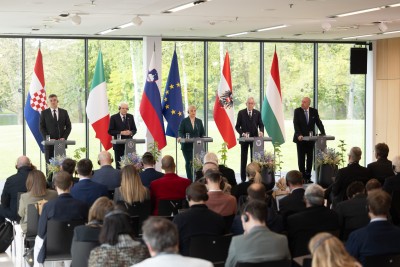Austria at 20 Years of Slovenia's EU Membership Under the Sign of Enlargement
At a time of profound changes and challenges in Europe, Slovenia is celebrating a significant anniversary of its EU membership. The celebrations were accompanied by a meeting of European heads of state, more specifically Slovenia's neighbors, who discussed the future of the Union and enlargement policy.
 Austria's Federal President Alexander Van der Bellen met his counterparts from Slovenia, Italy, Hungary and Croatia to mark the 20th anniversary of Slovenia's EU membership. / Picture: © Österreichische Präsidentschaftskanzlei / Peter Lechner/HBF
Austria's Federal President Alexander Van der Bellen met his counterparts from Slovenia, Italy, Hungary and Croatia to mark the 20th anniversary of Slovenia's EU membership. / Picture: © Österreichische Präsidentschaftskanzlei / Peter Lechner/HBF
At the highly symbolic location of Brdo near Kranj, the heads of state of neighboring Austria, Italy, Hungary, and Croatia came together to commemorate the past and set the course for the European future on the occasion of the twentieth anniversary of Slovenia's accession to the EU. Among the celebrating personalities was Federal President Alexander Van der Bellen, who emphasized the importance of EU membership and stressed the enlargement of the Union as the key to stability and growth.
The event, which was also a summit of dialog and cooperation, provided a platform for an exchange of the shared benefits of membership and support for the enlargement process, particularly about the Western Balkan states. Slovenia's President Nataša Pirc Musar spoke passionately about the benefits of a fully functioning Schengen area and appealed to those present to dismantle border controls to strengthen freedom of movement and togetherness within Europe.
During the press conference, Van der Bellen emphasized the importance of the EU as a value-based geostrategic project that secures peace, democracy, the rule of law, and freedom on the continent. He reaffirmed Austria's support for Ukraine and the country's clear strategic interest in EU enlargement, an undertaking that is not only of economic but also security policy significance.
Croatian President Zoran Milanović expressed his dissatisfaction with the slowness of the enlargement process and pointed out the political, not just technical, barriers that are hindering the process. He emphasized that EU enlargement would not be a major economic challenge if the political will was there. Milanović's comments clearly showed that full integration into the EU requires more than the fulfillment of formal criteria.
While Van der Bellen and Mattarella argued for reforms that would allow the EU to respond more quickly to current challenges, Hungarian President Tamás Sulyok warned against an increased federalist approach and spoke out against the transition from unanimity to qualified majority voting in EU decisions. These divergent opinions reflect the diversity and complexity within the Union.
As a visible sign of the common European heritage and the bond with nature, President Pirc Musar presented each of her counterparts with a seedling of the linden tree, the Slovenian national symbol, as a symbol of neighborly friendship and commitment to the fight against climate change. This gesture gave the ceremony an additional, future-oriented accent and reminded everyone of the need to tackle environmental challenges together alongside political and economic integration.
The meeting served not only to celebrate a historic milestone but also to strengthen mutual relations and reinforce the commitment to a more integrated, inclusive, and resilient Europe. While the events of the day showcased the EU with all its contradictions, the shared vision of a peaceful and prosperous European community was clearly at the forefront.



